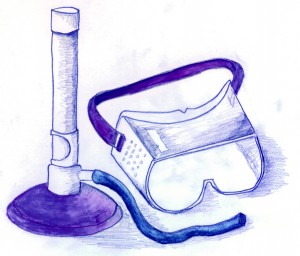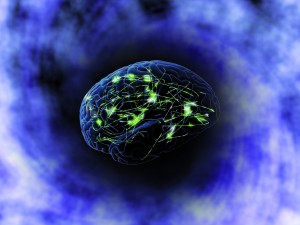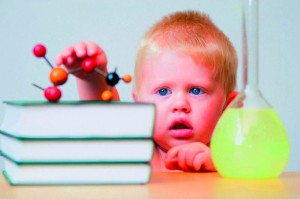MONDAY, 4 JANUARY 2010
Within sixty seconds of meeting someone, we process a host of social cues that are amalgamated to form an overall impression of them. To do this, the brain must be capable of processing complex data with extremely high speed and accuracy. But compare this ‘social cognition’ with the common difficulties of ‘thinking scientifically’. Why can’t we exploit all this processing power and make maths, physics and chemistry as simple as sizing up a stranger? Are the difficulties we have in learning science down to a lack of brain power or due to science being intrinsically ‘hard’ to learn?One of the challenges of science is that it requires our brains to work beyond their evolved capacity. For example, to appreciate the large numbers that we encounter in the modern world, we often need to break them down into concrete ratios or multiples, like ‘lengths of a football field’ or ‘number of double-decker buses’. It is impossible for us to appreciate large quantities or long spans of time because our brains evolved in an environment where they only needed to deal with about 200 people in a social group or 100 years of time. In evolutionary terms, we have never needed to count higher than this or to reason about abstract concepts. As a consequence our brains developed as ‘cognitive misers’, disinclined to waste valuable power on these tasks when what we need for survival is to be able to quickly and accurately evaluate situations and people.
Furthermore, ‘scientific thinking’ is not just a question of cognitive capacity, it also requires a certain set of cognitive skills. It involves the development of a hypothesis or question, accurate data collection and analysis as well as refinement of the hypothesis in light of the results. This requires abstract reasoning and logical thinking. Before sophisticated systems like the human body or complex theories like quantum mechanics can be understood, these cognitive skills must be developed. The time this takes may account for more of the difficulty we have in learning science, even once we are capable of scientific thinking.
In the first half of the 20th century, the learning theorist Jean Piaget noticed that young children find it hard to think in the logical way required by the sciences. He suggested that, as children progress through several developmental stages, they slowly develop the necessary cognitive skills. More recent experimental work has found that the ability to handle abstract concepts, a key skill for science and maths, increases with the accumulation of knowledge and experience.
However, before these cognitive skills develop, we are already learning about the world. From an early age, babies and children are what psychologists call ‘naïve scientists’ – they develop and test theories about the movement and behaviour of objects and people. For instance, young babies show surprise if an object starts to move without another moving object touching it. As we grow up, our knowledge of the world is based on all the information we have collected and the theories that we have built up through experience.
Science is partly hard to learn, therefore, because it involves ‘un-learning’ these theories that we’ve built up from observation over time. Through science, our knowledge of the physical world moves far beyond what we can perceive with our senses, and often turns out to be incompatible with experience. When a bus stops suddenly, we continue to move forward rapidly, according to Newton’s First Law, but what we experience is the sudden application of a sharp force from behind. Similarly, it is difficult for both children and adults to believe that motion continues perpetually in the absence of an opposing force because our experience has invariably been that an object will stop moving unless it is continuously propelled. Such experience is so ingrained that it is hard to reverse.
As science and technology become more complex, ‘science literacy’ in society is becoming increasingly important. The public and our MPs need the skills and understanding to evaluate new medical and technological advances and make decisions about them. The 2003 ‘Frankenfood’ controversy over genetically modified crops is one of the most high-profile examples of how a lack of scientific understanding can have a real effect on the future of society. Education must produce a future generation of more scientifically literate adults, yet according to the Relevance of Science Education project, coordinated by the University of Oslo, a majority of 15-year-olds report being ‘turned off’ by science. This is reflected by the reduced numbers choosing sciences and mathematics at GCSE and A-Level. For example, the number taking physics at A-Level has halved in the last ten years. It is further demonstrated by the closures of 80 university science departments between 2001 and 2007. New ways to teach science could be the answer, and knowledge of why we find it so difficult to learn may help.
So if we accept that thinking and learning about science is never going to be naturally ‘easy’, what do we do about it? In the last 20 years, the issue has been considered critical for the future of society and gained a huge amount of attention. Research into how children develop cognitive skills has helped to identify the steps involved in acquiring the sophisticated thinking required for science. It also seems likely that we must play to our brains’ strengths as well as fighting our weaknesses. Research shows that if we’re motivated to achieve a task, we’re much more able to overcome our ‘cognitive miser’ tendencies and make more reasoned and accurate judgements. Science education needs to tap into children’s motivation and help them to break down challenging, abstract concepts and knowledge into the concrete and relevant. It may seem like ‘dumbing down’, but it could be exactly what’s needed to help us smarten up.
Amy Miller is an MPhil student in the Faculty of Education



